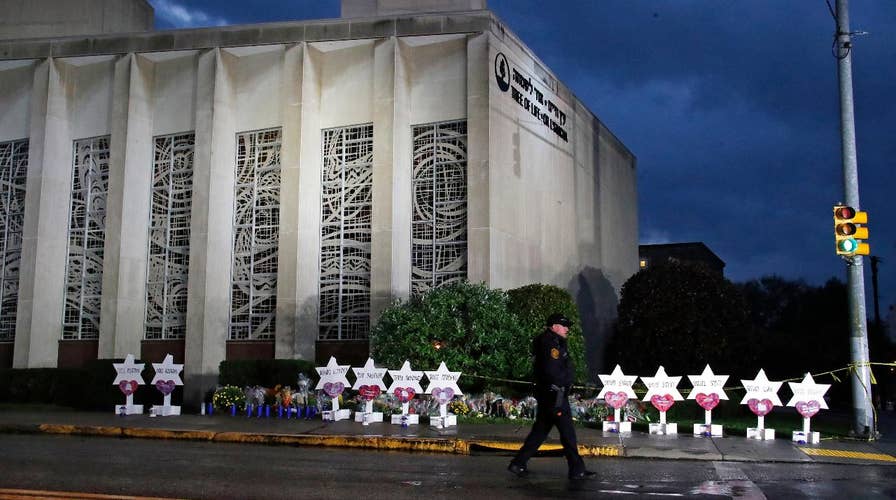Outpouring of support in Pittsburgh after synagogue shooting
Pennsylvania Rep. Keith Rothfus weighs in on the response to the tragedy that has rocked a community and calls for unity across the country.
The shock and horror of a gunman murdering 11 Jews at prayer in a Pittsburgh synagogue Saturday – while screaming “all Jews must die” – has traumatized the Jewish soul and shaken the core of all Americans. Christians are mourning with the Jewish community, for we are part of the same faith family through the Hebrew Bible.
As an Orthodox rabbi and an evangelical pastor, we see this tragedy through the lens of what the Bible teaches us about mourning. On this occasion, as the Jewish community mourns this tragedy, Christians and other non-Jews can learn about the beauty and wisdom of Judaism’s mourning customs, which the Jewish people have relied on for centuries to get them through individual and communal tragedies.
Like most Jewish practices, the origin of Jewish mourning customs comes from the Bible, which Jews read publicly from a Torah scroll in the synagogue as the highlight of the Shabbat service. It was this Shabbat service that was brutally disrupted at the Tree of Life synagogue in Pittsburgh on Saturday.
This coming weekend, Jews all over the world – from Pittsburgh to Jerusalem – will read from the Book of Genesis about Sara’s death and how Abraham purchased the Cave of the Patriarchs as her burial site. This passage is the first time mourning is mentioned in the Bible and is the source of many Jewish burial and mourning practices.
The Bible tell us that Abraham attended to the needs of his deceased wife, along with his own emotional needs. He purchased burial grounds and bitterly cried for his beloved. Jewish mourning customs likewise address both the physical, spiritual and emotional reality of death.
From the moment an observant Jewish person dies, he or she is attended by a Jewish burial society, known by its Hebrew term Chevra Kadisha, which literally translates to “holy society.” Its job is to clean and ritually prepare the body for burial and not to leave the body unattended. One of us – Rabbi Weisz – was a part of this sacred duty in Pittsburgh and sat and prayed with the 11 bodies in the Alleghany County Coroner’s Office.
Following interment in a Jewish cemetery, the immediate family returns to the home of the departed to sit shivah.
Shivah in Hebrew means seven, which is the prescribed number of days that the family members sit at home to receive condolence calls from the community and reflect on the life of their loved one. When visiting a shivah home, friends should quietly and respectfully wait for the mourners to begin the conversation, since everyone processes their grief differently and even innocent questions can cause pain.
Usually the mourners engage with visitors and recount memories of their dearly departed and often learn stories about their loved ones that they didn't know from neighbors, co-workers and old friends. This can be a great source of comfort to them.
For the next 30 days for a spouse, sibling or child – and 11 months for a parent – the mourner who follows tradition goes to the synagogue to say a special mourner’s prayer called Kaddish. The name of prayer means “holy” in Hebrew. The prayer goes back more than 1,000 years, and while not addressing death or grief directly, praises God and His great and holy name, even at this difficult time.
In some way, Jewish mourning practices all revolve around family, community and God. It is this threefold cord that has allowed Jews to persevere despite great national tragedies. And these three are so important for any individual to rely on in life’s most challenging moments.
Though mourning customs may differ, Christians have the same calling to mourn with one another. The New Testament book of Romans calls Christians to “rejoice with those who rejoice, and weep with those who weep.” We learn this also from Jesus, who was “deeply moved in spirit and troubled” when he saw his friends weeping. The poignancy of the moment is captured in the shortest verse in the New Testament: “Jesus wept.”
Christians have the opportunity to obey the call to “weep with those who weep” by committing to remember, grieve and pray for the Jewish community – not just this week, but throughout their time of mourning.
The murder of 11 Jews in Pittsburgh was the worst act of anti-Semitism in American history. But equally unprecedented is how so many non-Jews are choosing to stand shoulder to shoulder with the Jewish people in this time of sorrow.
In learning about how Judaism honors the dead, may we all – Jews and non-Jews – come to a greater appreciation of the value of life. By embracing our families, strengthening our communities and honoring God, we can fulfill the customary Jewish prayer to honor the deceased: “May their memory be a blessing.”
Dr. Ronnie Floyd is the senior pastor of Cross Church and president of the National Day of Prayer Task Force, which each year mobilizes millions of Americans to unified public prayer for the United States of America. Follow him on Twitter @ronniefloyd.

